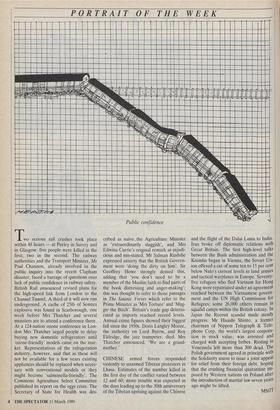PORTRAIT OF THE WEEK
Public confidence Two serious rail crashes took place within 48 hours — at Purley in Surrey and in Glasgow: five people were killed in the first; two in the second. The railway authorities and the Transport Minister, Mr Paul Channon, already involved in the public inquiry into the recent Clapham disaster, faced a barrage of questions over lack of public confidence in railway safety. British Rail announced revised plans for the high-speed link from London to the Channel Tunnel. A third of it will now run underground. A cache of 251b of Semtex explosive was found in Scarborough, one week before Mrs Thatcher and several ministers are to attend a conference there. At a 124-nation ozone conference in Lon- don Mrs Thatcher urged people to delay buying new domestic refrigerators until 'ozone-friendly' Models came on the mar- ket. Representatives of the refrigeration industry, however, said that as these will not be available for a few years existing appliances should be replaced when neces- sary with conventional models or they might become 'salmonella-friendly'. The Commons Agriculture Select Committee published its report on the eggs crisis. The Secretary of State for Health was des- cribed as naive , the Agriculture Minister as 'extraordinarily sluggish', and Mrs Edwina Currie's original remark as injudi- cious and mis-stated. Mr Salman Rushdie expressed anxiety that the British Govern- ment were 'doing the dirty on him'. Sir Geoffrey Howe strongly denied this, adding that 'you don't need to be a member of the Muslim faith to find parts of the book distressing and anger-making'; this was thought to refer to those passages in The Satanic Verses which refer to the Prime Minister as 'Mrs Torture' and 'Mag- gie the Bitch'. Britain's trade gap deterio- rated as imports reached record levels. Annual crime figures showed their biggest fall since the 1950s. Doris Langley Moore, the authority on Lord Byron, and Roy Eldridge, the jazz trumpeter, died. Mrs Thatcher announced, 'We are a grand- mother.'
CHINESE armed forces responded violently to unarmed Tibetan protesters in Lhasa. Estimates of the number killed in the first day of the conflict varied between 12 and 60; more trouble was expected in the days leading up to the 30th anniversary of the Tibetan uprising against the Chinese
and the flight of the Dalai Lama to India. Iran broke off diplomatic relations with Great Britain. The first high-level talks between the Bush administration and the Kremlin began in Vienna; the Soviet Un- ion offered a cut of some ten to 15 per cent below Nato's current levels in land armies and tactical warplanes in Europe. Seventy- five refugees who fled Vietnam for Hong Kong were repatriated under an agreement reached between the Vietnamese govern- ment and the UN High Commission for Refugees; some 26,000 others remain in squalid camps within the British colony. In Japan the Recruit scandal made steady progress: Mr Hisashi Shinto, a former chairman of Nippon Telegraph & Tele- phone Corp, the world's largest corpora- tion in stock value, was arrested and charged with accepting bribes. Rioting in Venezuela left more than 300 dead. The Polish government agreed in principle with the Solidarity union to issue a joint appeal for relief from their foreign debt, hoping that the crushing financial quarantine Un- posed by Western nations on Poland after the introduction of martial law seven years ago might be lifted.
MSLIT


























































 Previous page
Previous page